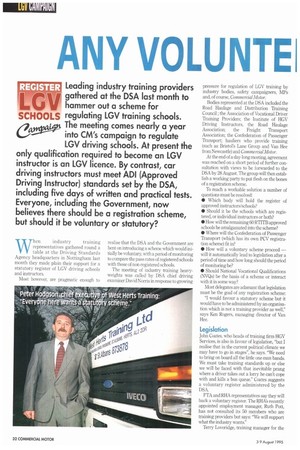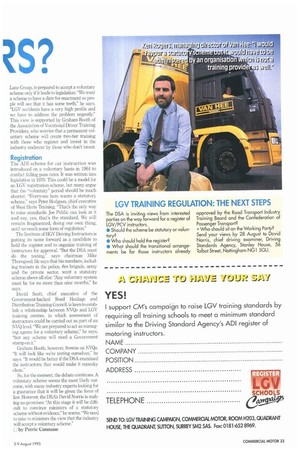ANY VOLUNTE
Page 44

Page 45

If you've noticed an error in this article please click here to report it so we can fix it.
Leading industry training providers gathered at the DSA last month to hammer out a scheme for regulating LGV training schools. e, • The meeting comes nearly a year
into CM's campaign to regulate
SCHOOLS
LGV driving schools. At present the only qualification required to become an LGV instructor is an LGV licence. By contrast, car driving instructors must meet ADI (Approved Driving Instructor) standards set by the DSA, including five days of written and practical tests. Everyone, including the Government, now believes there should be a registration scheme, but should it be voluntary or statutory?
When industry training representatives gathered round a table at the Driving Standards Agency headquarters in Nottingham last month they made plain their support for a statutory register of LGV driving schools and instructors.
Most however, are pragmatic enough to realise that the DSA and the Government are bent on introducing a scheme which would initially be voluntary, with a period of monitoring to compare the pass rates of registered schools with those of non-registered schools.
The meeting of industry training heavyweights was called by DSA chief driving examiner David Norris in response to growing
pressure for regulation of LGV training by industry bodies, safety campaigners, MPs and, of course, Commercial Motor.
Bodies represented at the DSA included the Road Haulage and Distribution Training Council ; the Association of Vocational Driver Training Providers; the Institute of HGV Driving Instructors, the Road Haulage Association; the Freight Transport Association; the Confederation of Passenger Transport; hauliers who provide training (such as Bristol's Lane Group and Van Hee from Newcastle) and Commercial Motor.
At the end of a day-long meeting, agreement was reached on a short period of further consultation with views to be forwarded to the DSA by 28 August. The group will then establish a working party to put flesh on the bones of a registration scheme.
To reach a workable solution a number of questions must be resolved: • Which body will hold the register of approved instructors. /schools?
• Should it be the schools which are registered, or individual instructors or both?
• How will the remaining 60 RTITB approved schools be amalgamated into the scheme?
• Where will the Confederation of Passenger Transport (which has its own PCV registration scheme) fit in?
• How will a voluntary scheme proceed — will it automatically lead to legislation after a period of time and how long should the period of monitoring be?
• Should National Vocational Qualifications (NVQs) be the basis of a scheme or interact with it in some way?
Most delegates are adamant that legislation must be the goal of any registration scheme: "I would favour a statutory scheme but it would have to be administered by an organisation which is not a training provider as well," says Ken Rogers, managing director of Van Hee.
Legislation
John Coates, who heads of training firm HGV Services, is also in favour of legislation, "but I realise that in the current political climate we may have to go in stages", he says. We need to bring on board all the little one-man bands. We must take training standards up or else we will be faced with that inevitable prang where a driver takes out a lorry he can't cope with and kills a bus queue." Coates suggests a voluntary register administered by the DSA.
FTA and RHA representatives say they will back a voluntary register. The RHNs recently appointed employment manager, Ruth Pott, has not consulted its 50 members who are training providers but says: We will support what the industry wants."
Terry Loveridge, training manager for the Lane Group, is prepared to accept a voluntary scheme only if it leads to legislation: "We want a scheme to have a date for enactment so people will see that it has some teeth," he says. "LGV accidents have a very high profile and we have to address the problem urgently." This view is supported by Graham Booth of the Association of Vocational Driver Training Providers, who worries that a permanent voluntary scheme will create two-tier training with those who register and invest in the industry undercut by those who don't invest.
Registration
The ADI scheme for car instruction was introduced on a voluntary basis in 1964 to combat falling pass rates. It was written into legislation in 1970. This could be a model for an LGV registration scheme, but many argue that the "voluntary" period should be much shorter. "Everyone here wants a statutory scheme," says Peter Hodgson, chief executive of West Herts Training. "That's the only way to raise standards. Joe Public can look at it and say, yes, that's the standard. We will remain fragmented, doing our own thing, until we reach some form of regulation."
The Institute of HGV Driving Instructors is putting its name forward as a candidate to hold the register and to organise training of instructors for approval. "But the DSA must do the testing," says chairman Mike Thorogood. He says that his members, including trainers in the police, fire brigade, army and the private sector, want a statutory scheme above all else: "Any voluntary system must be for no more than nine months," he says.
David Scott, chief executive of the Government-backed Road Haulage and Distribution Training Council, is keen to establish a relationship between NVQs and LGV training centres, in which assessment of instructors could be carried out as part of an NIFQ level. "We are prepared to act as managing agents for a voluntary scheme," he says, "but any scheme will need a Government stamp on it."
Graham Booth, however, frowns on NVQs. "It will look like we're testing ourselves," he says. "It would be better if the DSA examined the instructors; that would make it squeaky clean."
So, for the moment, the debate continues. A voluntary scheme seems the most likely outcome, with many industry experts looking for a guarantee that it will be given the force of law. However, the DSAs David Norris is making no promises: 'At this stage it will be difficult to convince ministers of a statutory scheme without evidence," he warns. "We need to take to ministers the view that the industry will accept a voluntary scheme."
iJ by Patric Cannane
































































































